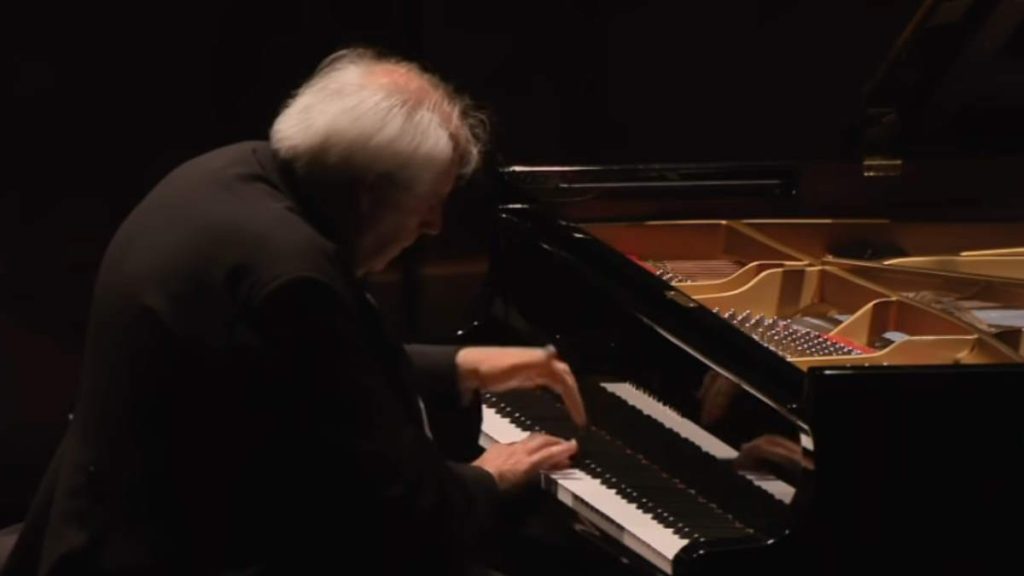Grigory Sokolov plays Johann Sebastian Bach’s Gigue from Partita No. 1, BWV 825. This performance was recorded during the Festival de La Roque d’Anthéron 2015 by the French filmmaker, writer, and violinist Bruno Monsaingeon.
Bach’s Gigue from Partita No. 1, BWV 825
Johann Sebastian Bach’s Gigue from Partita No. 1 in B-flat major, BWV 825 is a lively and intricate dance movement that closes the suite. Composed as part of Bach’s first set of keyboard partitas, this Gigue showcases his mastery in blending rhythm, counterpoint, and harmonic richness.
The piece is written in a fugal style, where a theme or subject is introduced and then developed through various imitative entries. It embodies the exuberance and complexity typical of a gigue, a dance originating from the British Isles, often characterized by its fast tempo and lively rhythms.
Bach’s Gigue in this partita is particularly notable for its intricate interweaving of voices and rhythmic drive, which challenges the performer to maintain clarity and precision. The movement, though structurally rigorous, is filled with energy and joy, making it a delightful conclusion to the suite.
Grigory Sokolov
Grigory Lipmanovich Sokolov, born on April 18, 1950, in Leningrad (now Saint Petersburg), is a distinguished Russian pianist, renowned for his profound interpretations and exceptional technical skill. His repertoire is extensive, ranging from Baroque composers like Bach, Couperin, and Rameau to 20th-century composers such as Schoenberg and Arapov. Despite being one of the most respected pianists of his generation, Sokolov’s career trajectory has been unconventional, shaped by both political circumstances and his personal choices.
Sokolov’s musical journey began early; he started piano lessons at age five and by seven, he was admitted to the Leningrad Conservatory’s special school for gifted children, studying under Leah Zelikhman. He later continued his studies with Moisey Khalfin. By the age of 12, Sokolov had already performed his first major recital in Moscow, playing an ambitious program that included works by Bach, Beethoven, Schumann, Chopin, and others. His prodigious talent was recognized internationally at age 16 when he won the gold medal at the 1966 International Tchaikovsky Piano Competition, making him the youngest winner in the competition’s history.

Despite this early success, Sokolov’s international career did not fully develop until the late 1980s. Although he toured the United States and other countries in the 1970s, the political climate of the time, particularly the Soviet invasion of Afghanistan and the subsequent breakdown of cultural exchanges between the U.S. and the Soviet Union limited his ability to perform abroad. During the 1980s, Sokolov’s presence in the international music scene diminished, especially in the United States, and he played no concerts outside Russia during the breakup of the Soviet Union.
In recent decades, however, Sokolov has become a prominent figure in European concert halls, though he remains less known in the U.S. His recording output has been sparse, with a notable 20-year gap between 1995 and 2015. In 2014, he signed a contract with Deutsche Grammophon, leading to the release of recordings of his live performances, including a 2015 two-CD set of a live recital in Salzburg featuring works by Mozart, Chopin, Scriabin, Rameau, and Bach.
Sokolov, who now resides in Italy, was granted Spanish citizenship in August 2022, further marking his international stature. Despite his relatively low profile outside of Europe, he is revered for his deep musical insight, technical brilliance, and the emotional intensity he brings to his performances.
Sources
- Partitas for keyboard (Bach) on Wikipedia
- Partita in B-flat major, BWV 825 (Bach, Johann Sebastian) on the International Music Score Library Project website